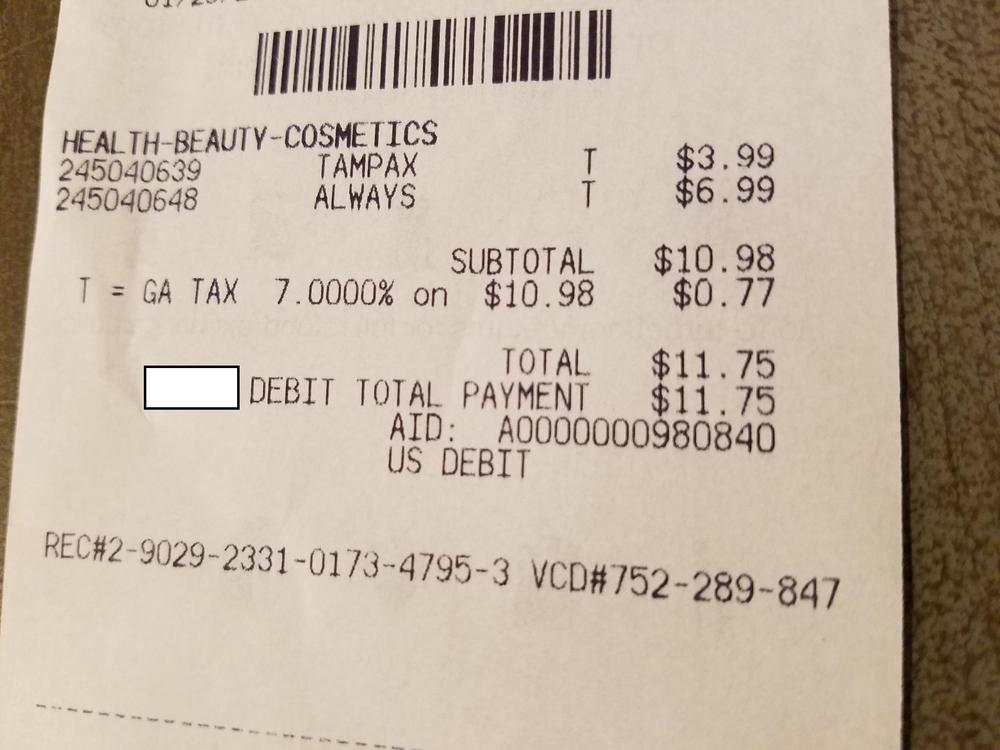Section Branding
Header Content
Women Push To End Georgia Sales Tax On Menstrual Products
Primary Content
From adolescence to menopause, most women have to deal with a monthly reality: their periods. It can be messy, painful and expensive. The cost of tampons, pads and menstrual cups can add up. In Georgia, women and their families also pay sales tax on those products. Some women are hoping to change that.
Georgia women are trying to end the state's sales tax on menstrual products.
On a recent weekday morning, the halls of Marietta High School were packed. Students were going to lunch or class. They had exams, projects, plenty to worry about. Some had one more concern:
“I’ll come to school, I’ll feel a little something, and it’s like, oh, it’s that time of the month,” said senior Jummoke James.
Even if James doesn’t have supplies for her period on her, she said, it’s ok: teachers have them.
“I don’t really have to worry about rushing home or having to run to CVS to buy those products,” James explained.
That’s a good thing, she said, especially because for some students running out to buy tampons isn’t just inconvenient. It’s too expensive.
“I’m lucky. I come from a financially stable family, so I never have to worry about it because I can always call my mom and say ‘hey can you buy me some pads,’” James said. “But I have friends who that isn’t really an option.”
“We know that some of our young ladies don’t have access to feminine care,” said Rona Roberts. She directs Marietta High School’s Student Life Center, including the program that provides menstrual products.
Most schools in Georgia don’t have a program like this.
In her two decades working in schools, Roberts said, girls have often told her they’re reusing pads and tampons, or not changing them, for a simple reason:
“They don’t have the money to buy the products,” she said. “If you put a tax on the products, then that compounds the issue.
Like most states, Georgia does have a tax: the four percent state sales tax, plus local taxes in some places. Four states, including Florida, have lifted their tax in the last two years.
GPB’s reporter paid it a few days ago, buying tampons and pads at a Target in Savannah. The subtotal came to $10.98. With a seven percent tax – 77 cents – the total rose to $11.75.
That doesn’t sound like a lot, if you can afford it. But Mia Mance with the Junior League of Savannah said it adds up.
“You literally have your period for over 2,000 days of your life,” she said. “And in the state of Georgia right now, we are charged at a four percent tax on an essential medical device.”
The Junior League, along with several other women’s groups, is leading to push to lift this tax. Medical devices like diabetes test strips are exempt from state and local sales taxes. A bill in the Georgia legislature would add menstrual products to that list.
“Women make up two-thirds of the minimum wage jobs in our state,” said Representative Debbie Buckner (D-Junction City), who’s sponsoring the bill. “So they are having to pay taxes on something that other medical devices do not have a tax assessed on, and it’s just a fairness issue, quite frankly.”
The sales tax on menstrual products brings in about $9 million each year, according to the state’s audit department. Buckner and her cosponsors said they believe they can find a way to cover that tax revenue.
Buckner said the House is off to a slow start, between a new governor, winter weather this week and now the Super Bowl – tickets to which, she noted, are tax exempt.
Once the Super Bowl’s over, Buckner thinks the bill has a strong chance of passing.



